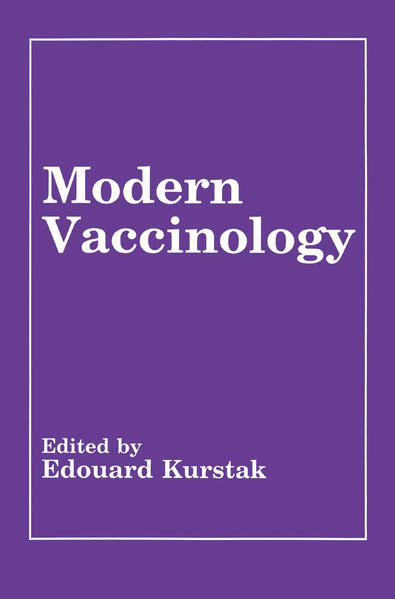
Zustellung: Fr, 06.12. - Di, 10.12.
Versand in 1-2 Wochen
VersandkostenfreiBestellen & in Filiale abholen:
The recent developments in modern vaccinology are mainly based on: (i) cloning of microbial genes into recombinant vectors containing genetic information for expression of desired neutralizing immunogens; (ii) alternatives of attenuated vectors with deleted genes permitting the insertion of several foreign genes expressing antigens exposed to the host immune system during the abortive replication of such vectors; (iii) combined vaccines with the aim to protect against many diseases with a limited number of administrations; (iv) evidence demonstrating the ability of animals to respond serologically to DNA injections considered as a potential method of vaccination; (v) the possibility to manipulate the immune system with new and improved immunomodulators enhancing the immune response; and (vi) new microcarrier systems for particular immunogens or immunomodulators delivery, either in a single dose or sustained release, and presentation to the immune system for a relevant response. New vaccines being developed are mainly based on viral, bacterial or other vectors modified with genetic engineering technology, to possess and express desired antigens for vaccination against single or multiple infections. Existing combined vaccines like diphtheria, tetanus, pertussis (DTP) are also experimented with new additional components like recombinant hepatitis B virus surface antigen, inactivated poliovirus, and Haemophilus inJluenzae type b immunogens, in order to produce multivalent vaccines. Such types of vaccines permitting the reduction of multiple medical visits is of particular interest to pediatric immuni zation programs, and would benefit especially the developing countries assuring better vaccine compliance with immunization schedules.
Inhaltsverzeichnis
Editor s Introduction Modern Vaccinology: Progress Towards the Global Control of Infectious Diseases.- I New Concepts in Vaccines Development and Immune Response.- 1. Vaccination with Polynucleotides: A Novel Means of Generating Immunity.- 2. Development of Vaccines by Grafting Microbial Epitopes in Immunoglobulins.- 3. Conventional and New Generation Combined Vaccines.- 4. Progress in the Development of Multivalent Oral Vaccines Based on Live Attenuated Salmonella.- 5. Potentiation of Vaccines Through Effective Adjuvant Fomulations and Manipulation of the Immune Response.- II Recombinant Vaccines and Multivalent Immunogens.- 6. Recent Advances in Recombinant Vaccines for Viral and Parasitic Diseases.- 7. Hepatitis B Virus Recombinant Vaccines: Achievement and Progress.- 8. Recombinant Hepatitis B Surface Antigen as Carrier of Human Immunodeficiency Virus (HIV) Epitopes: Towards a Dual Immunogenic Vaccine.- 9. Genetically Engineered Human Immunodeficiency Virus Type 1 (HIV-1) Vaccines.- 10. Rotavirus Vaccine Development.- 11. Progress in the Development of Recombinant Vaccines Against Dengue and Other Arthropod-Borne Flaviviruses.- 12. Expressed Antigens of Hantaviruses as Potential Vaccines for Hemorrhagic Fever with Renal Syndrome.- 13. Development of Recombinant Measles Vaccines.- 14. Development of Subunit Paramyxoviridae Vaccines.- 15. Rabies Recombinant Vaccines: Development and Field Application.- 16. The New Generation of Recombinant Pertussis Vaccines.- 17. The Use of Recombinant Proteins and Synthetic Peptides in the Development of a Plasmodium falciparum Malaria Vaccine.- 18. Development of a Recombinant Vaccine Against Schistosomiasis.- Contributors.
Produktdetails
Erscheinungsdatum
30. September 1994
Sprache
englisch
Auflage
1994
Seitenanzahl
412
Herausgegeben von
Edouard Kurstak
Verlag/Hersteller
Produktart
gebunden
Abbildungen
X, 398 p.
Gewicht
969 g
Größe (L/B/H)
260/183/27 mm
Sonstiges
HC runder Rücken kaschiert
ISBN
9780306448201
Entdecken Sie mehr
Bewertungen
0 Bewertungen
Es wurden noch keine Bewertungen abgegeben. Schreiben Sie die erste Bewertung zu "Modern Vaccinology" und helfen Sie damit anderen bei der Kaufentscheidung.









